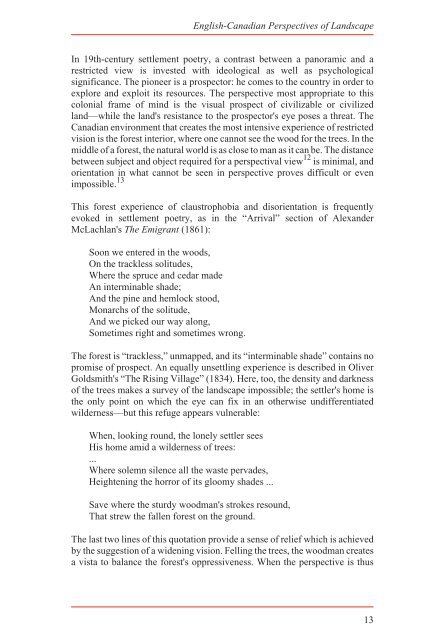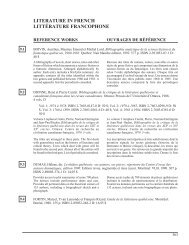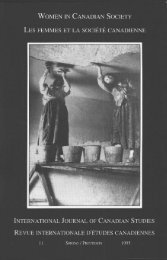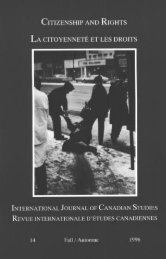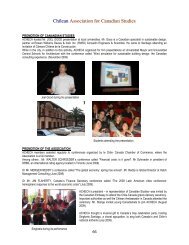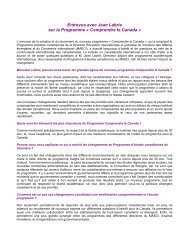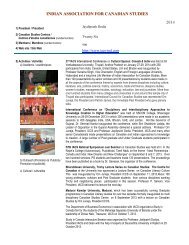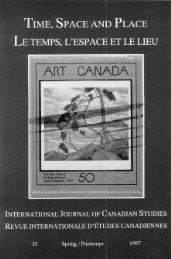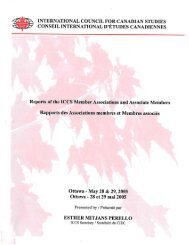Arts and Literature in Canada:Views from Abroad, Les arts et la ...
Arts and Literature in Canada:Views from Abroad, Les arts et la ...
Arts and Literature in Canada:Views from Abroad, Les arts et la ...
- No tags were found...
Create successful ePaper yourself
Turn your PDF publications into a flip-book with our unique Google optimized e-Paper software.
English-Canadian Perspectives of L<strong>and</strong>scapeIn 19th-century s<strong>et</strong>tlement po<strong>et</strong>ry, a contrast b<strong>et</strong>ween a panoramic <strong>and</strong> arestricted view is <strong>in</strong>vested with ideological as well as psychologicalsignificance. The pioneer is a prospector: he comes to the country <strong>in</strong> order toexplore <strong>and</strong> exploit its resources. The perspective most appropriate to thiscolonial frame of m<strong>in</strong>d is the visual prospect of civilizable or civilizedl<strong>and</strong>—while the l<strong>and</strong>'s resistance to the prospector's eye poses a threat. TheCanadian environment that creates the most <strong>in</strong>tensive experience of restrictedvision is the forest <strong>in</strong>terior, where one cannot see the wood for the trees. In themiddle of a forest, the natural world is as close to man as it can be. The distanceb<strong>et</strong>ween subject <strong>and</strong> object required for a perspectival view 12 is m<strong>in</strong>imal, <strong>and</strong>orientation <strong>in</strong> what cannot be seen <strong>in</strong> perspective proves difficult or evenimpossible. 13This forest experience of c<strong>la</strong>ustrophobia <strong>and</strong> disorientation is frequentlyevoked <strong>in</strong> s<strong>et</strong>tlement po<strong>et</strong>ry, as <strong>in</strong> the “Arrival” section of Alex<strong>and</strong>erMcLach<strong>la</strong>n's The Emigrant (1861):Soon we entered <strong>in</strong> the woods,On the trackless solitudes,Where the spruce <strong>and</strong> cedar madeAn <strong>in</strong>term<strong>in</strong>able shade;And the p<strong>in</strong>e <strong>and</strong> hemlock stood,Monarchs of the solitude,And we picked our way along,Som<strong>et</strong>imes right <strong>and</strong> som<strong>et</strong>imes wrong.The forest is “trackless,” unmapped, <strong>and</strong> its “<strong>in</strong>term<strong>in</strong>able shade” conta<strong>in</strong>s nopromise of prospect. An equally uns<strong>et</strong>tl<strong>in</strong>g experience is described <strong>in</strong> OliverGoldsmith's “The Ris<strong>in</strong>g Vil<strong>la</strong>ge” (1834). Here, too, the density <strong>and</strong> darknessof the trees makes a survey of the l<strong>and</strong>scape impossible; the s<strong>et</strong>tler's home isthe only po<strong>in</strong>t on which the eye can fix <strong>in</strong> an otherwise undifferentiatedwilderness—but this refuge appears vulnerable:When, look<strong>in</strong>g round, the lonely s<strong>et</strong>tler seesHis home amid a wilderness of trees:...Where solemn silence all the waste pervades,Heighten<strong>in</strong>g the horror of its gloomy shades ...Save where the sturdy woodman's strokes resound,That strew the fallen forest on the ground.The <strong>la</strong>st two l<strong>in</strong>es of this quotation provide a sense of relief which is achievedby the suggestion of a widen<strong>in</strong>g vision. Fell<strong>in</strong>g the trees, the woodman createsa vista to ba<strong>la</strong>nce the forest's oppressiveness. When the perspective is thus13


